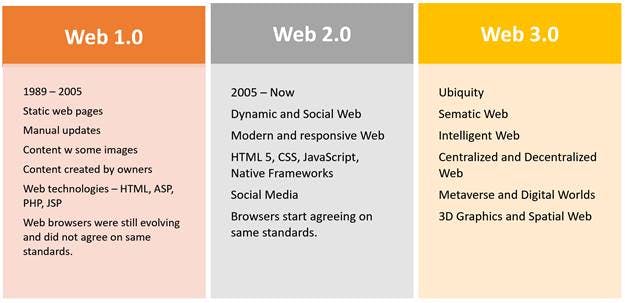
What the heck is this web3.0?
Is this new kid on the block worth all the hype?
Hi, I promise to make this a regular one.
Continuing from last week on my web3 series.
Among the buzzwords these days in the Tech world has been web3 or any of its iterations; decentralized web, or semantic web or the Metaverse. It is praised to be a huge paradigm shift from where we are today going by the fact that it embraces such "lofty" concepts as 'transparency', 'trustlessness', 'decentralization' etc.
So for the benefit of a 5 year old, Let me bore down to what I understand as web3.0 and why I am even interested in now.
So in a brief, I will try to explain why it is even termed web3.0, what are its attributes(ie how can we say that it is web3.0), what are the use cases? Is it something one should bother themselves about?
Before web3.0, there was web2.0 and before the latter, there was web1.0.
So what are the differences among the trio?
We can call web1.0 the good ol' web as this is where we started from the late 1980s. It was mainly marked by static web pages which only seem to provide information to the user. They naturally would not be able to interact with it. There is no much difference from reading a newspaper on the web. Web1.0 started fading off in the early 2000s and finally gave way to web2.0 around 2005.
Web2.0 brought some level of interact-ability to the user. Now they could feel online forms and provide feedback to the website. This further made it easy for the emergence of Social Media as communities where users can not only interact with the websites but with one another metamorphized. The likes of Facebook, Twitter and Youtube are big illustration of the power of web2.0.

Much as we all like to spend a lot of our time on Social Media these days, it is pertinent to mention that this comes at a cost. A huge one depending on who you ask. One of such is data privacy. When we post our profiles and pictures all over the internet, little do we ask where all these go to. First of all, we voluntarily surrender these personal details to Facebook and the likes. We also do not care what they do with them even as it has been proved that they don't disclose much about how they use them. So with a lot of uncertainty hovering over this issue and others, a new era inevitably beckons.
The emergence of web3.0 brings a lot of promise at least in the era of user data security. The development of this technology is intentionally run to be free from domination by any single entity. Decentralization is the watch word here as no single behemoth like Google or Amazon can set up servers and then get the rest of us to throw in our data there. We should be able to agree among ourselves(as in a consensus) how we want to host our data. It should be an entity where we do not need to trust each other. It is taken for granted(hence the term, "trustless"). It also should be a transparent place where everything we do should be verified by any one who wants to.
Web3.0 is in its early, formative days. A whole lot is happening now but there's still a lot in the offing. I am still trying to find my way through the maze. With some research and work, the path becomes clearer.
My next article will address the use cases of web3.0 further. Subsequent ones will deepen them.
Cheerio.
